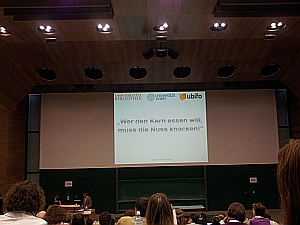Data Policies in Open Access Journals: Not all that glitters is “gold”
Posted: October 15th, 2012 | Author: Sven | Filed under: Conference, EDaWaX | Tags: Data Policies, Data Sharing, open access | 1 Comment » At the end of September, I was in beautifull Vienna for some days and presented a few results of our project at the 6th Open Access Days in a session about “Making Research Data publicly available: opportunities and challenges“.
At the end of September, I was in beautifull Vienna for some days and presented a few results of our project at the 6th Open Access Days in a session about “Making Research Data publicly available: opportunities and challenges“.
It’s been a very nice conference – and some blogposts [Uli Herb -> telepolis (in German) | Astrid Recker -> admtic (in English)] report on the conference and some of the presentations. My colleques Olaf Siegert, Ralf Flohr and I also wrote a summary of the conference for ZfBB (in German) that will be published in the next issue of the journal.
Well, to come back to my talk: In this post I want to point out some single aspects of my presentation: the availability of data policies in economic scholarly journals that are published open access.
Our project compared the number and quality of data policies we found in a sample of 43 open access Journals to a sample of 141 traditional subscription journals in regard to the implementation of data availability policies.
Generally speaking I wondered how open access journals acquit themselves in this context. Prior to starting our analysis I was quite sure that the percentage of journals equipped with a data availability policy would be higher in open access journals than the proportion of subscription journals equipped with such a policy. I even thought that open access journals could have a comparative advantage to traditional subscription journals: Read the rest of this entry »








